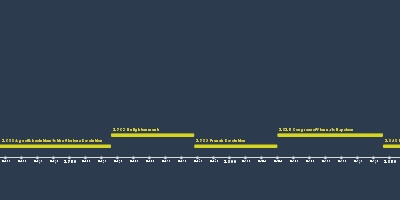1763 Enlightenment (1 janv. 1763 – 1 janv. 1789)
Description:
Unit 4:Contextualizing the Scientific Revolution and Enlightenment
Scientific Revolution:
- Astronomy, medicine, and reasoning, -heliocentric theory (Copernicus, Kepler ellipses, Galileo telescope proof)
- Index of prohibited books
-Medicine: Galen humeral theory 4 kinds of substances in body = WRONG, Paracelsus thought chemical imbalance causes sickness, Harvey circulation, Bacon inductive reasoning, Descartes deductive reasoning, scientific method, Alchemy
Enlightenment:
Reaction from absolutism, Voltaire french philosopher criticized religious intolerance in France and believed in enlightened monarch and Deism god did not intervene, Diderot Encyclopedia rational explanation of everything religious tolerance, Atheism believe in no God, David Hume skepticism, religion became private matter not state matter, more secular, John Locke natural rights, popular sovereignty people can only be governed with their consent, Jean Jacques Rousseau social contract citizens give up some power in exchange for protection general will and have right to change the government, Mary Wollstonecraft women rights the declaration of the rights of women like DORMAC education and opportunity, Adam Smith Capitalism supply and demand free market imports>exports invisible hand Wealth of Nations, Printing Press and Salons (Women led) spread ideas
Enlightened Absolutism:
acted in enlightened ways when it benefited them, short-sighted reforms, Fredrick II of Prussia patronized philosophers freedom of speech reformed judicial system and reduced class difference consolidate power, Catherine II (the Great) of Russia reformed penal system banned torture patronized art, increased religious tolerance,
18th-Century Society and Demographics:
Birth rates increased, death rates decreased due to better medicine = large population increase, healthier and stronger, Plague disappeared, Smallpox vaccine, Thomas Malthus outgrow food supply, nuclear family, marrying later, illegitimate births increased, dedicate more space in home to separate rooms
Agricultural Revolution:
drained wetlands, crop rotation beans and clover replenish soil, selective breeding of livestock, seed drill, canals and roads and bridges, urbanization steel plow, not enough housing so created tenements with poor plumbing and air circulation so increased disease and low sanitation,
18th-Century Culture and Arts:
censorship increased, reading revolution, newspapers periodicals, pamphlets, exposed literate population to culture and celebrated other culture, Baroque style until 1750 inspire awe shifted to Neoclassicism focus on middle class/bourgeois simplicity, symmetry, Jane Austen pride and prejudice, consumer revolution upper class had more disposable income due to industrial revolution, privacy, coffeehouses
Enlightened and Other Approaches to Power
Causation in the Age of Scientific Revolution and Enlightenment
Ajouté au bande de temps:
Date:
1 janv. 1763
1 janv. 1789
~ 26 years
